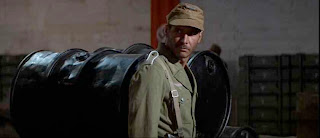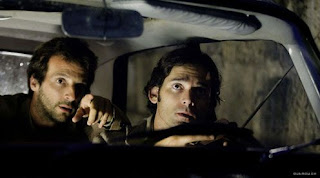
A few posts back, I argued that Mayor Vaughn's warning against "yell[ing] shark" in Jaws was a moment of open self-reflection by Steven Spielberg, describing his own M.O. in directing the film but cloaking the revelation in narrative conversation. I brought up that concept again when discussing Betsy's "walking contradiction" line in Taxi Driver; it's a pet game of mine. Spielberg's remained one of my favorite directors even at his worst (Hook, The Lost World, The Terminal). The only thing that's ever shaken my faith is how rarely he returned to that moment of explicit contemplation following Jaws' unprecedented success. The obvious, glorious exception is Indy's "Oh, a sword? How adorable" move in Raiders of the Lost Ark (a happy accident resulting from Harrison Ford's dysentery, but I'm a hopeless auteurist and too young to know better, so I give the director credit). Yet Spielberg, inventor of the blockbuster, unparalleled CGI pioneer, and majority shareholder in the collective American memory of the Holocaust, stands to benefit by shedding some more light on his own success. I say this only partially for the sake of my own private parlor games (stop judging me, imaginary contemptuous audience). It bothers me that Spielberg displayed less and less reflection on his films' status as popular icons even as, through the '90s, he tackled weightier, trickier material. A good wink would've cut perfectly through the string-soaked treacle of Saving Private Ryan.
Over the last decade, that subtle self-awareness has returned to Spielberg's films, but in a manner fitting the grave, futurist urgency of his best new works. The mass-produced Davids in A.I. and the unreliable video-visions in Minority Report hinted at a director uncertain about his own place in the American popular consciousness, and willing to explore how such power might play itself out decades down the line. As I said in the aforementioned Jaws post, however, it wasn't until 2005 that Spielberg returned to that most elemental of wake-up calls, blank horror devoid of any meaning beyond our own shared fear.
In Spielberg's hands, War of the Worlds becomes a misnomer. Wars tend to have turning points, back-and-forths that bubble over into comebacks like the one feverishly recorded in Saving Private Ryan. What War of the Worlds records is extermination, barely staved off near film's end. As such, the turning point deals with something different, and far more complicated, than victory.

An hour into War of the Worlds, the Ferrier family is traipsing through yet another desolate farmyard on their way to yet another sanctuary that won't be enough to protect them from the hell raining down from the heavens. Robbie (Justin Chatwin) suddenly speeds up, ignoring his father Ray (Tom Cruise) and sister Rachel's (Dakota Fanning) cries for him to return. Robbie straggles his way up a shallow hill, beyond which we can see an unearthly yellow glow: the promise of carnage unending, cinematic thrill-violence with the safety off. Ray is Tom Cruise possessed of his most unfettered (and, in this film, comforting) athleticism, and he catches his son easily. "Why are you doing this! Why!" Ray roars, finally bereft of the puckish bravado he had previously hid his wounded alienation behind ("Boston? That how it is?") Robbie just stares back at him. Chatwin's eyes had previously exemplified the annoying prettiness common to male goth teens in American cinema. Now, the obnoxious (if unerringly justified) anger is gone, as are the kid's stuttering attempts at explaining the passion that drives him. They are replaced with a blank, reverent acceptance as frightening as any mecha from beyond the moon. "I have to see...you have to let me see this."
Ray understands, as his body sags away; he watches unmoving as his son runs, possessed, to his doom. And, ultimately, that's all there is to War of the Worlds, the most artfully (and brutally) simple blockbuster in recent memory. There is no lesson, there is no arc, there is no skill, there is no war. All you can do is watch, bear witness. As Robbie's eyes testify, there are few more powerful lures. Surely we can agree--don't we show up in droves to watch, pile into the cinema to see?
This is violence as irrevocably physical, a purely instinctive transfer from the action to the observer: a sly generic transgression as unsettling--and resonant--as Cronenberg's A History of Violence that same year. Spielberg returns to that idea in the first part of the film's ending, which he swipes neatly from Wells--the aliens defeated by Earth's innate reactions, while we scurry around on the planet's surface, powerless as ever. Yet, as much as I'd like to forget about it, there's the matter of the actual ending, in which Spielberg pulls such a spectacular cop-out (the kid survived) that I had to suspect some sort of massive, cannibalistic cynicism at work, rather than the easy sentimentality staring me in the face. If Robbie lived, is bearing witness Spielberg's salvation, the only way to come through the fire with your humanity intact? Certainly, it's an idea that dovetails with the filmmaker's intentions for Schindler's List, but it doesn't jive so well with the rest of War of the Worlds itself, in which watching is but the purest locus of horror. Robbie's religious pilgrimage over the hill isn't a moral victory, it's an instinctive rush, and rewarding (or punishing) him for it seems beside the point. Witnessing is its own phenomenon and end, and death is merely an inevitable formality when the sky rains fire.

Or, hell, maybe Spielberg was just frantically looking for a way to end this traumatic scar of a blockbuster, the darkest fantasy he's ever unleashed on the popcorn-buying public. War of the Worlds' ceaseless flow is never swept up by the cavalry, rarely leavened by calm or humor, and absolutely devoid of the charming, magnetic, and/or redemptive individuals that mark Spielberg's earlier landmarks. It's Jurassic Park without any experts. It's Raiders of the Lost Ark, not only without Indy, but without any top men. It's Saving Private Ryan, with no way to fight back and no "back home" to fight for. It's Empire of the Sun, but with no chance to reach across the borders. E.T., with no individuals among the intruders. Close Encounters, but they want to farm your blood after they beam you up. Schindler's List, but they've come for absolutely everybody.
Was that last one in poor taste? Perhaps, but grave reverence would dilute the pure existential chill that haunts that pivotal eye-to-eye in War of the Worlds. With all taste and palatable history stripped away, leaving only the simplest of fantasies and the starkest of realities to collide, it was difficult for many to embrace War of the Worlds as a deadly serious and aware film, beyond the expertly calibrated genre trappings. Certainly, it was easier to wait a few months and fall over ourselves praising Spielberg's Munich, but I feel the two work best taken together. 2005, then, is endgame for Spielberg's best ideas: as sinuous storyteller, as soul-shaking image factory, as allegorical myth-maker, as humanist saint. No wonder Kingdom of the Crystal Skull felt so inessential--Spielberg's planet-sized philosophies had reached their peak. War of the Worlds is that philosophy's purest expression, blurring the lines between spectacle and tragedy, reminding us all the while that our approach, for better or worse, is the same for both: to look and see.



































































